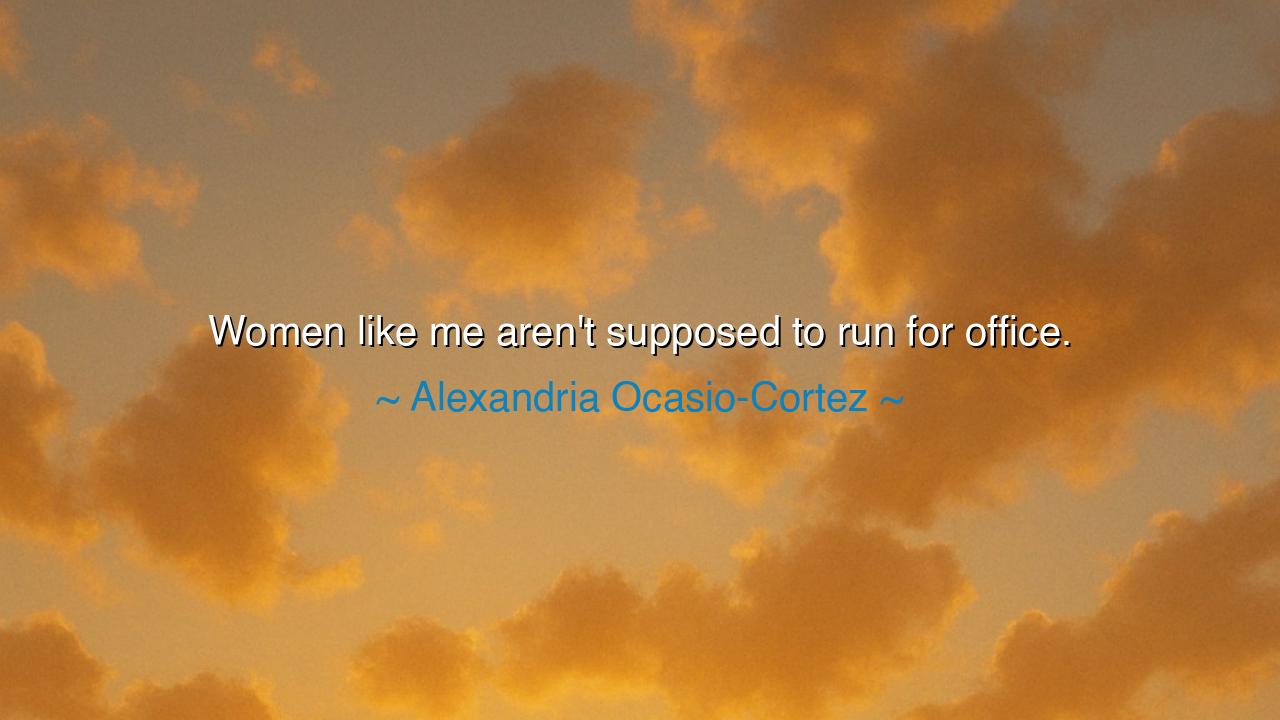
Women like me aren't supposed to run for office.






The words of Alexandria Ocasio-Cortez, “Women like me aren’t supposed to run for office,” are both confession and defiance. In them is the weight of centuries, when women, especially women of humble birth, were told their place was in silence, service, or survival—but never in power. Her words echo with the voice of countless souls denied by tradition, by class, by race, and by gender, who were told that leadership was not for them.
In the ancient world, the gates of office were guarded fiercely. Kings and senators, lords and generals, all spoke of liberty, yet denied it to their mothers, their daughters, their sisters. Even in Athens, the cradle of democracy, women had no vote, no voice in assembly, no place in public leadership. That which was called universal freedom was in truth freedom for men alone. Thus, when Ocasio-Cortez speaks, she unmasks the survival of this same ancient exclusion, carried forward into the modern age.
Consider the story of Shirley Chisholm, the first Black woman elected to the United States Congress in 1968. She too was told she did not belong, facing both racial prejudice and sexism from her colleagues. Yet she declared herself “unbought and unbossed,” and by her courage, she opened doors for women who would follow. Like Ocasio-Cortez, she bore the weight of a world that insisted, “Women like you cannot lead,” and yet she proved that very world wrong.
Ocasio-Cortez’s words also speak to fear—the fear of entrenched power that trembles when the excluded rise. For when the poor, the immigrant, the woman, or the outcast dares to claim office, the illusion of control is broken. The rulers can no longer pretend that leadership is reserved for the chosen few; the many will see themselves reflected in power, and they too will rise.
So let this truth endure: every time a woman once told “you are not supposed to” dares to lead, the chains of history crack. The office is not the inheritance of men or of the wealthy, but the shared trust of all the people. And those who were never “supposed” to rule may, by their courage, reshape the very meaning of leadership. Thus, Ocasio-Cortez’s words are not despair, but prophecy—the rising of voices once silenced, the beginning of a new order where no one is told they do not belong.






TEDakota Phenix Tran Eubanks
When Alexandria Ocasio-Cortez says that women like her aren’t supposed to run for office, it’s a powerful acknowledgment of the challenges she faced. But is it also a statement about the broader societal issue of women being kept out of leadership roles? What does it take to break down the barriers that continue to tell women they are not fit for power, and how can we support more women like her to take charge?
LLLinh Linh
Ocasio-Cortez’s comment about women not being 'supposed to run for office' highlights the power of societal expectations and stereotypes. But her success also raises the question: How many women with the potential to lead are still discouraged from running due to these biases? What more needs to be done to make the political system more inclusive and truly representative of the people?
HNThai Hoang Nhung
There’s something deeply empowering about Ocasio-Cortez’s statement. She acknowledges the barriers, but her rise to power also shows that these expectations can be overcome. How much has society truly changed since she made this statement? Are women still facing the same challenges in politics, or has there been enough progress for more women to feel like they belong in positions of leadership?
DKPham Dang Khoa
Ocasio-Cortez’s words are a reminder of how difficult it is for women to break into spaces that are traditionally male-dominated, like politics. Why are women often made to feel that they don't belong in positions of power? Is the system still rigged against women, or are we seeing a shift where women are slowly starting to claim more political influence and break down these old barriers?
UGUser Google
This quote from Ocasio-Cortez is powerful because it reveals the deeply ingrained gender biases that exist in politics. She’s not just referring to herself, but to all women who challenge the status quo. What does it say about the political system if women are still told they’re 'not supposed' to run? Shouldn't leadership be based on ability and ideas rather than gender or preconceived notions?